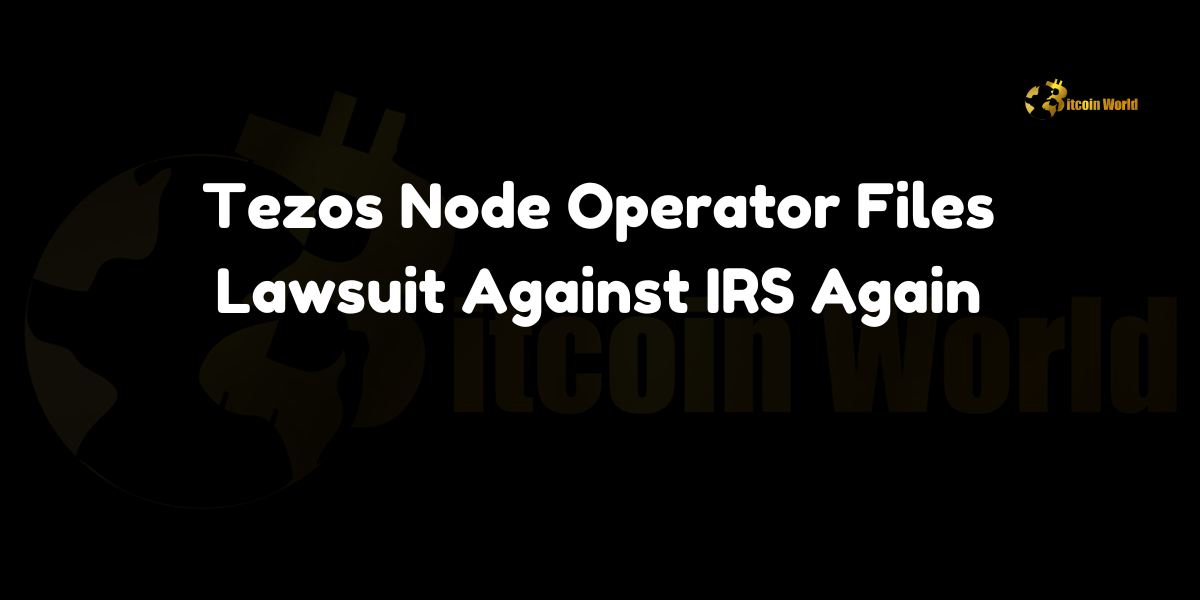Tezos Node Operator Files Lawsuit Against IRS Again
In a continued battle against tax regulations, Josh Jarrett, a validator node operator (baker) on the Tezos (XTZ) network, has once again filed a lawsuit against the Internal Revenue Service (IRS). Reported by The Block, Jarrett’s latest legal action highlights ongoing disputes over the taxation of cryptocurrency rewards and seeks the return of previously paid taxes, drawing support from prominent advocacy groups within the crypto community.
Background of the Lawsuit
Josh Jarrett, known for his active role in the Tezos ecosystem, has taken legal action against the IRS, challenging the agency’s stance on the taxation of token rewards. In his complaint, Jarrett contends that current tax laws are flawed, particularly the requirement that token rewards be reported as income. This stance has significant implications for node operators and participants in decentralized networks who receive cryptocurrency rewards as part of their operational activities.
Details of the Complaint
In his lawsuit, Jarrett not only questions the legality of the IRS’s requirements but also seeks the return of $12,179 in taxes paid by his spouse, Jessica Jarrett, on 13,000 XTZ purchased in 2020. This specific request underscores the personal financial impact that tax regulations can have on individual investors and participants within the crypto space.
Support from Coin Center
The lawsuit has garnered support from Coin Center, a renowned non-profit cryptocurrency research and advocacy group. Coin Center’s backing adds significant weight to Jarrett’s claims, as the organization is well-respected for its efforts to influence public policy and promote responsible regulation in the crypto industry. Their involvement suggests a broader concern within the community regarding the IRS’s approach to cryptocurrency taxation.
Previous Legal Actions
Jarrett’s current lawsuit is not his first encounter with the IRS over tax-related issues. In 2021, he filed a similar lawsuit concerning his 2019 tax bill. However, that complaint was dismissed earlier this year, indicating a persistent legal struggle between Jarrett and the IRS. The repeated legal challenges highlight the complexities and uncertainties surrounding cryptocurrency taxation and the evolving nature of regulatory frameworks.
Implications for the Crypto Community
Jarrett’s legal actions bring to the forefront several critical issues within the cryptocurrency ecosystem:
- Taxation of Crypto Rewards: The core of the dispute revolves around how cryptocurrency rewards are classified and taxed. Clarifying these regulations is essential for the sustainability and growth of decentralized networks.
- Regulatory Clarity: Ongoing lawsuits signal a need for clearer guidelines from regulatory bodies like the IRS to prevent future conflicts and ensure fair treatment of crypto participants.
- Financial Impact on Individuals: The financial burden of taxes on crypto rewards can be substantial, as evidenced by Jarrett’s request for the return of taxes paid. This situation raises concerns about the accessibility and fairness of crypto investments for everyday users.
The Future of Crypto Regulation
As the cryptocurrency market continues to expand, regulatory bodies worldwide are grappling with how to effectively oversee and integrate digital assets into existing financial systems. Lawsuits like Jarrett’s highlight the urgent need for:
- Comprehensive Tax Guidelines: Establishing clear and consistent tax regulations for various crypto activities to reduce legal ambiguities.
- Stakeholder Engagement: Encouraging dialogue between regulators, industry participants, and advocacy groups to develop balanced policies that support innovation while ensuring compliance and security.
- Education and Awareness: Increasing efforts to educate both taxpayers and regulators about the unique aspects of cryptocurrency transactions to foster better understanding and cooperation.
Conclusion
Josh Jarrett’s ongoing legal challenges against the IRS underscore the critical tensions between cryptocurrency innovation and regulatory frameworks. By contesting the taxation of token rewards and seeking the return of previously paid taxes, Jarrett is not only advocating for his financial interests but also highlighting broader systemic issues within crypto regulation. Supported by Coin Center, his actions may pave the way for more robust discussions and potential reforms in how digital assets are treated under the law.
To learn more about the innovative startups shaping the future of the crypto industry, explore our article on latest news, where we delve into the most promising ventures and their potential to disrupt traditional industries.
Disclaimer: The information provided is not trading advice, Bitcoinworld.co.in holds no liability for any investments made based on the information provided on this page. We strongly recommend independent research and/or consultation with a qualified professional before making any investment decisions.




